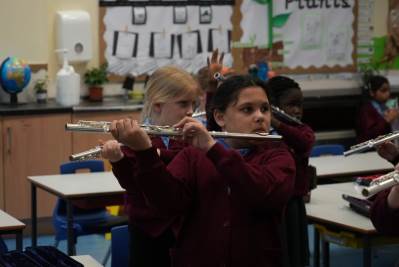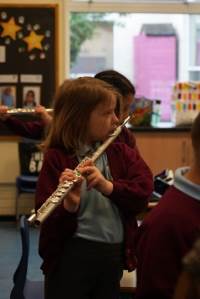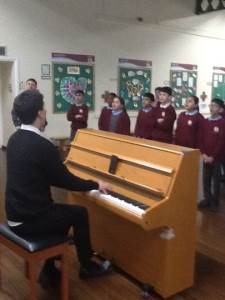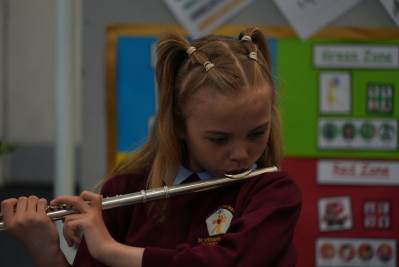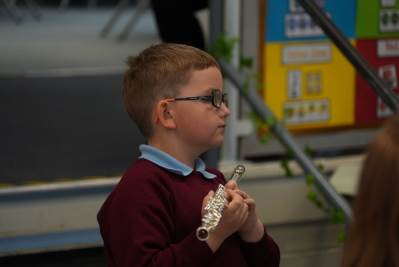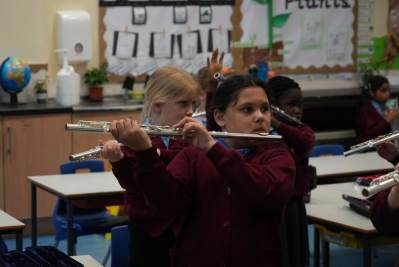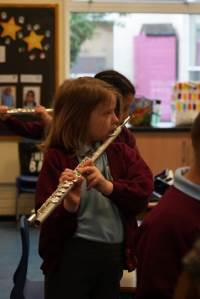Music

Intent
The children at St William’s are immersed in a range of musical experiences, as a ‘School of Diversity’ this includes listening and responding to music from different times, being exposed to music from different cultures as well as gaining the vocabulary to evaluate current music. Music and singing supports the overall development of a well-rounded individual and mental wellbeing and is another reason why St. William’s School has high regard for this area of learning.
Music lessons give children the opportunity to understand the language of music both in terms of the technical vocabulary needed to learn a musical instrument and as a form of expression and communication. Through opportunities to play and compose music together, pupils will be able to experience how music connects and unites people. As a ‘School of Faith’ music is an essential part of worship and children are given opportunities to experience the beauty of singing as a class, a whole school and as a parish. Through music lessons we believe this helps pupils gain more self-confidence and enables them to express themselves through music and learn to respect a range of artists and genres.
‘When words fail, music speaks.’ Hans Christian Andersen
Implementation
As a ‘School of Mastery’ the music curriculum is taught progressively from reception to year 6 and ensures children sing, listen, play, perform and evaluate as well as developing specific knowledge, skills and understanding. This is embedded in the programme of study as well as specialist music teaching: singing lessons and opportunities to practice and perform through the Leeds Diocese singing provision. In Years 3, 4 & 5, children learn to play the flute with the Bradford Music and Arts Service and in doing so they understand the different principles of creating notes, as well as how to devise and read their own musical scores and basic music notation. Music is incorporated into workshops and assemblies with visits from musicians who give the children opportunities to play as part of a group. Pupils can compose or perform using body percussion and vocal sounds, which develops the understanding of musical elements without the added complexity of an instrument. Using the Charanga resource, children will listen carefully to a range of different genres of music throughout their primary education. These include reggae, classical, rap and rock. They will also learn about popular musicians and the history of music. As a 'School of Oracy' they will learn to articulate their own responses using their growing musical vocabulary through our dialogic teaching strategies and to promote pupils’ oracy skills.
We follow the Mastery approach for learning where each child completes the same level of work but progresses at their own pace and with provision for scaffolding for all our learners including those with SEND and disadvantaged pupils who are supported appropriately, there is no ceiling on learning as we want all children to achieve their full potential. Teachers aim to meet all needs through modelling and support.
Becoming musicians
As a ‘School of Enquiry’ the children will learn how to experiment with different sounds, read music notation, compose their own music and perform to an audience. They will get the opportunity to be part of a choir and perform to a range of audiences, in our local community, Trust events and beyond.
As a 'School of Mental Wellness' children will have fun creating music. They will enjoy listening to their favourite music, playing instruments and singing their favourite songs; all of which have a positive effect on their mental health.
Impact
Children will be able to continue their musical journey at their secondary school and they will have opportunities to develop their instrumental work and work together with other musicians joining future choirs and bands. They will have a lifetime love of music. As a result of this curriculum, children at St. William’s will be able to respond to a variety of music including music from different periods and cultures. Children will be able to enjoy music in as many ways as they choose – either as listener, creator or performer. They will feel confident when discussing music and comprehending its parts. They will be able to sing, feel a pulse, add rhythms, and create melodies in a group and they can further develop these skills in the future and continue to enjoy and embrace music in their lives.
Music is life itself
Louis Armstrong
Curriculum Overview
curriculum overview for music.pdf
Long Term Plan
Knowledge Skills
-
knowledge- -skills---year-1
download_for_offline
download_for_offlineknowledge- -skills---year-1
- knowledge- -skills---year-2 download_for_offline
download_for_offlineknowledge- -skills---year-2
- knowledge- -skills---year-3 download_for_offline
download_for_offlineknowledge- -skills---year-3
- knowledge- -skills---year-4 download_for_offline
↑download_for_offlineknowledge- -skills---year-4
- knowledge- -skills---year-6 download_for_offline
download_for_offlineknowledge- -skills---year-6
- knowledge- -skills---year-r download_for_offline
download_for_offlineknowledge- -skills---year-r
- knowledge-skills---year-5 download_for_offline
download_for_offlineknowledge-skills---year-5
Vocabulary
keywords and vocabulary for teachers.pdf
Music
- knowledge- -skills---year-2 download_for_offline






